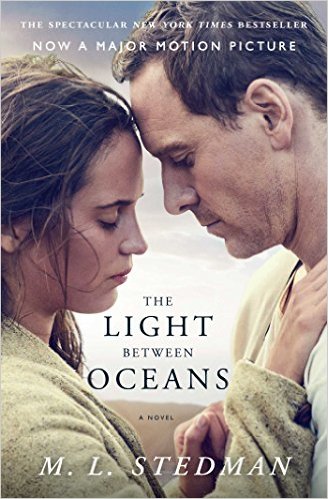Tag Archives: book recommendations
Book Review: First Cosmic Velocity
Book Reviews: WHITE ELEPHANT and MIRACLE CREEK
Book Reviews: Recent Releases Ripe for Reading
One of the great joys of participating in the D.C. area writing community is getting to know so many of the exceptionally talented authors who call the area home. An added bonus is learning some of the backstory behind their work, including what it took to bring to publication. Here are two books from D.C. writers that were just released in October.
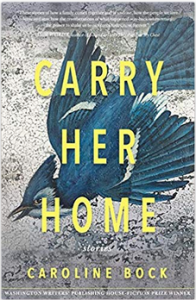 Carry Her Home, Caroline Bock, Washington Writers Publishing House, 2018, 218 pp.
Carry Her Home, Caroline Bock, Washington Writers Publishing House, 2018, 218 pp.
This collection of flash fiction and longer stories, many of which are inter-related, is fully, deliciously unexpected. From the first tiny but densely meaningful story, “The Understanding”, and the second, “O, Tomato,” which reads like prose poetry, it doesn’t take long to catch the rhythm of the stories and a sense of direction, and to realize that what remains unstated carries as much weight as what is on the page.
Book Review: Waiting for Eden
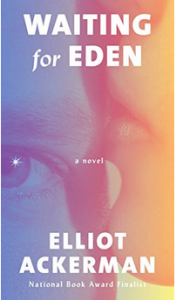 Within the first few sentences of Waiting for Eden, readers realize they are in for something out of the ordinary when the first-person narrator says matter-of-factly, “I was sitting next to Eden and luckier than him when our Humvee hit a pressure plate, killing me and everybody else, him barely surviving.”
Within the first few sentences of Waiting for Eden, readers realize they are in for something out of the ordinary when the first-person narrator says matter-of-factly, “I was sitting next to Eden and luckier than him when our Humvee hit a pressure plate, killing me and everybody else, him barely surviving.”
But out-of-the-ordinary has become the rule for the novels of Elliot Ackerman, author of the critically acclaimed debut Green on Blue, National Book Award finalist Dark at the Crossing, and now his latest, Eden, being released on September 25.
As a journalist, Ackerman was based for a number of years in Istanbul, starting in 2013, where he covered the Syrian Civil War. Among other publications, his writing has appeared in The New Yorker, The Atlantic, The New Republic, and The New York Times Magazine, and his stories have been included in The Best American Short Stories.
Moving Beyond Auto-fiction to the Epic: Three Novel Recommendations
The English publication of the volumes of Karl Ove Knausgard’s My Struggle coincides with a renewed interest in “auto-fiction,” also known as the autobiographical novel. While I have read and enjoyed several of these works of auto-fiction, my favorite is Elena Ferrante’s Neapolitan Novels, which seemed to draw on some auto-fiction elements, but also used other literary devices such as image patterning and developing character arcs, while incorporating motifs of class, politics, art, motherhood, friendship, and feminism.
Since finishing the Neapolitan series I’ve found myself wanting to read more novels that span generations, placing themselves in historical context, in which history itself (just as Ferrante’s working class post-war Italy) becomes a character. Three recent novels fit this bill, and I recommend them to anyone desiring epic historical novels that educate as well as entertain.
It’ll Soon be Time to Enjoy HARD CIDER
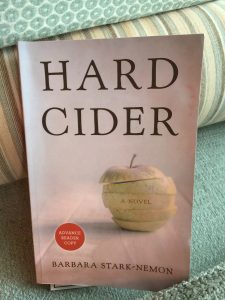 I’ve often written about my admiration of and appreciation for small, independent book publishers, those folks who are in the business much more because of their love of books than their pursuit of the next big blockbuster. Publishing these days has an ever-slimming profit margin amid fierce competition, and that makes things even more challenging for those who do this for love.
I’ve often written about my admiration of and appreciation for small, independent book publishers, those folks who are in the business much more because of their love of books than their pursuit of the next big blockbuster. Publishing these days has an ever-slimming profit margin amid fierce competition, and that makes things even more challenging for those who do this for love.
A small publisher that has drawn positive attention for its business model and a gratifying level of success is She Writes Press. In 2016, books from She Writes Press were awarded seventeen medals at the Independent Publisher Book Awards, the most awards to one press in that year. Under the guiding hand of publisher Brooke Warner, the press has gone from a catalog of eight titles in 2013 to an impressively long list for both spring and fall in this, their six year.
Little Town, Big Exposure: A Visit to the 9th Annual Gaithersburg Book Festival
Bad Weather Doesn’t Stop Book Lovers
In the opening hours of the Ninth Annual Gaithersburg Book Festival, the skies were an ugly steel gray and the precipitation shifted across mist, sprinkle, drizzle, and steady rain — and still the book lovers came out in force. Sporting umbrellas and rain ponchos, they were ready to hear their favorite authors read from and discuss books at the different literary tents, browse the new and used bookstores and independent booksellers, get their books signed while chatting with those favorite authors, grab something tasty from the food vendors, and go back again for more.
Of the many book festivals that the Baltimore-Washington area now enjoys, Gaithersburg is my personal favorite. Though it often draws over twenty thousand attendees and attracts many nationally known authors, it still has a very intimate feeling.
Short Story Collection: Don’t Wait to Be Called
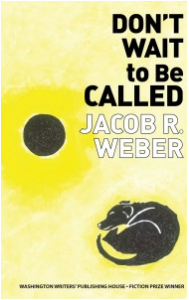 At the Washington Writers Conference coming up in May, I’ll be moderating a panel with four local authors whose debut books made it to publication through very different paths. Each book is also a different genre — memoir/journalism, biography, novel, and short story collection — which means I’m reading four very different books to prepare for the panel.
At the Washington Writers Conference coming up in May, I’ll be moderating a panel with four local authors whose debut books made it to publication through very different paths. Each book is also a different genre — memoir/journalism, biography, novel, and short story collection — which means I’m reading four very different books to prepare for the panel.
The short story collection, Don’t Wait to Be Called, is by Jacob R. Weber. Publication resulted from Weber’s winning the annual fiction prize given by Washington Writers’ Publishing House, a non-profit small press that publishes authors from the Baltimore/Washington area. Weber’s roots, which are on display in his stories, hedge towards the Baltimore end of that geography.
Weber’s biography reads like someone who has lived a few different lives, as a Marine, a translator, and an English tutor to adult immigrants, as well as a waiter and a retail clerk and manager.
Richard Ford’s Bascombe, A Jersey Guy
 As a transplanted but still loyal New Jerseyite, I was skeptical when a friend recommended Richard Ford’s book Let Me Be Frank with You as a humorous take on Hurricane Sandy. I couldn’t imagine anything funny about the storm that leveled large swaths of my former state, but I was curious to see how anyone could. While I differ with her characterization of this as a humorous take, I wholeheartedly agree with her recommendation of this book.
As a transplanted but still loyal New Jerseyite, I was skeptical when a friend recommended Richard Ford’s book Let Me Be Frank with You as a humorous take on Hurricane Sandy. I couldn’t imagine anything funny about the storm that leveled large swaths of my former state, but I was curious to see how anyone could. While I differ with her characterization of this as a humorous take, I wholeheartedly agree with her recommendation of this book.
Let Me Be Frank with You is humorous the way Chaplin’s Little Tramp was humorous, the way Larry David’s “Curb Your Enthusiasm” is humorous, and the way life is humorous. There’s artistry in blending the bitter and the sweet, and Ford is a master at it.
A Book to Capture Your Imagination
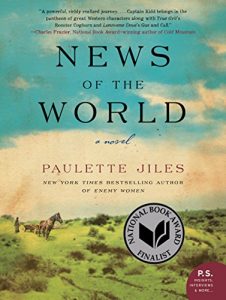 The 2016 novel News of the World by Paulette Jiles is beautiful, poetic, and riveting, and takes you to a world that’s familiar but full of mystery, all in just 240 pages. It fascinated me so much that I immediately sought out information on the history behind the fiction — the lives of children captured by Native Americans in mid-nineteenth-century Texas.
The 2016 novel News of the World by Paulette Jiles is beautiful, poetic, and riveting, and takes you to a world that’s familiar but full of mystery, all in just 240 pages. It fascinated me so much that I immediately sought out information on the history behind the fiction — the lives of children captured by Native Americans in mid-nineteenth-century Texas.
News of the World tells the story of Captain Jefferson Kyle Kidd, a seventy-one-year-old widower and Army veteran who travels the towns of North Texas entertaining audiences by reading selected articles from national and international newspapers. After one reading, an acquaintance, Britton Johnson, asks him to return a ten-year-old white girl to an aunt and uncle, her nearest living relatives, who live hundreds of miles away, near San Antonio.
AN INTERVIEW WITH M.O. WALSH, AUTHOR OF MY SUNSHINE AWAY
When M.O. Walsh released his debut novel My Sunshine Away, reviewers named him the newest member of the Southern gothic literary tradition. The novel, which I reviewed on Late Last Night Books here, offers the rich atmosphere and haunting darkness associated with the Southern gothic school, but it also offers many-faceted characters caught in some of life’s profound dilemmas. In recognition of its excellence, My Sunshine Away won the Pat Conroy Southern Book Award for General Fiction. I was delighted when Walsh agreed to answer questions about his inspirations, writing techniques, and more.
S.W. What is appealing about the U.S. South in general as a setting? Would you ever consider writing a novel set somewhere other than the South?
KNOW THE MOTHER Shows What Flash Fiction Can Do
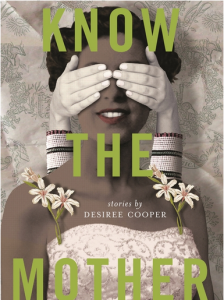 Though she loves to read novels, author Desiree Cooper found that her fiction comes from her in a much shorter form. “If there was no such thing as flash fiction, I would have had to invent it,” says the 2016 debut author of the collection of flash fiction titled Know the Mother. If you’re not terribly familiar with flash fiction, which works to tell an evocative story in a very compressed space, this lovely, haunting collection demonstrates just how effective and affecting this genre can be.
Though she loves to read novels, author Desiree Cooper found that her fiction comes from her in a much shorter form. “If there was no such thing as flash fiction, I would have had to invent it,” says the 2016 debut author of the collection of flash fiction titled Know the Mother. If you’re not terribly familiar with flash fiction, which works to tell an evocative story in a very compressed space, this lovely, haunting collection demonstrates just how effective and affecting this genre can be.
Mother’s stories have a strong common thread of dreams delayed or abandoned — suppressed under the weight of obligation — and of how identity is tied to those dreams. Who are we, really, if we’re never allowed to be who we want to be?
A Reader’s Reader
“I have always imagined that Paradise will be a kind of library.”
—Jorge Luis Borges
I had the distinct pleasure recently of being on a panel at the Washington Writers Conference with Tom Shroder—author, ghostwriter, journalist, and long-time editor of the Washington Post Magazine—and Michael Dirda, even longer-time book critic at the Washington Post and elsewhere. We were discussing the fuzzy lines that separate memoir, family history, and fiction.
As part of preparing for the panel, I read two of Michael’s several books: his most recent, Browsings, and his memoir of the first third of his life through college, An Open Book.
Let the Book Speak for Itself
A Review of Hillbilly Elegy
In my last posting, I discussed three books of non-fiction that touched on topics of empathy, compassion, and a shared social contract, and that together, I felt, made some illustrative commentary on the events of that day, January 20th, 2017. One book that I had hoped to include—but which landed on my reading stack a bit too late to make the cut—was another unexpectedly successful work of non-fiction. It, too, highlights some of the themes of my earlier discussion.
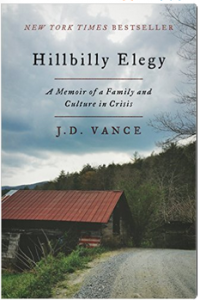 Hillbilly Elegy: A Memoir of a Family and Culture in Crisis is a memoir by a young Yale-educated lawyer named J.D. Vance. He beats his readers to the punch in offering his own wry objection to a 31-year-old’s writing a memoir, but he has much to offer us as he relates his own experience in what is arguably the most forgotten and dismissed segment of the American population.
Hillbilly Elegy: A Memoir of a Family and Culture in Crisis is a memoir by a young Yale-educated lawyer named J.D. Vance. He beats his readers to the punch in offering his own wry objection to a 31-year-old’s writing a memoir, but he has much to offer us as he relates his own experience in what is arguably the most forgotten and dismissed segment of the American population.
Nobel Prize Winner Patrick Modiano’s Dora Bruder
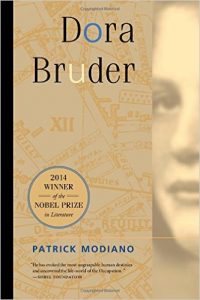 Last year when the Nobel Prize in Literature went to Bob Dylan, many people responded with the question, Why? Two years earlier when the Nobel Prize committee named Patrick Modiano the recipient of its literature prize, another question was often asked, Who?
Last year when the Nobel Prize in Literature went to Bob Dylan, many people responded with the question, Why? Two years earlier when the Nobel Prize committee named Patrick Modiano the recipient of its literature prize, another question was often asked, Who?
Though Modiano had published about thirty works in his native France, he was almost unknown in this country. Only a dozen of his novels had been translated into English, and the publishing house David R. Godine, which had published three of them, sold only about 8,000 copies.
The Nobel Prize changed that, and we readers are the beneficiaries.
Between the Devil and the Deep Blue Sea
Take a beautiful sea setting, add a few endearing but complex 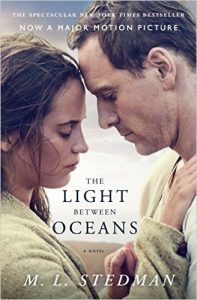 characters, top it off with serious moral dilemmas, and what do you get? The Light Between Oceans, an excellent debut novel by M.L. Stedman.
characters, top it off with serious moral dilemmas, and what do you get? The Light Between Oceans, an excellent debut novel by M.L. Stedman.
Set mostly at a lighthouse on Janus Rock, an island off the coast of Australia, The Light Between Oceans tells the story of Tom and Isabel Sherbourne, the lighthouse keeper and his wife, who live alone on the island, visited only once a season by two men who bring them supplies. This isolated existence suits Tom, who believes that if he can get far enough away from people and memories, time will heal the mental and emotional wounds he carries from fighting in World War I, especially the nightmares that remind him of the blood on his hands.
Book Review: The Bowl with Gold Seams
I’ve written frequently about my admiration for small-press publishing, folks who are driven more by their love of the written word than by any expectation of making a commercial killing. It’s that willingness to simply go with what they love that leads many small presses to build impressive catalogs of work by authors of remarkable talent. This month I’m highlighting another example of this marriage of small press to big talent.
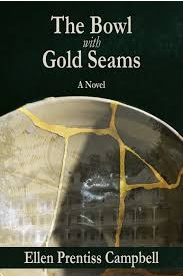 I originally heard about Ellen Prentiss Campbell from several sources almost simultaneously, one of which was our shared publisher. As small presses go, publishers don’t come much smaller than Apprentice House Press, run out of Loyola University. Of unique note, though, Apprentice House is both non-profit and student-run. Students learn by doing; authors get unparalleled input into the creative process behind bringing a traditionally published work into print.
I originally heard about Ellen Prentiss Campbell from several sources almost simultaneously, one of which was our shared publisher. As small presses go, publishers don’t come much smaller than Apprentice House Press, run out of Loyola University. Of unique note, though, Apprentice House is both non-profit and student-run. Students learn by doing; authors get unparalleled input into the creative process behind bringing a traditionally published work into print.
10 Great American Political Novels
Ten Great American Political Novels for Trying Times
As the campaign season draws to a close, there’s one thing we can all agree on: Truth is, indeed, stranger than fiction. But what about fiction with a strong political theme? Can it help us understand and make sense of the world around us? You bet it can, and I’ve got just the list to prove it.
Whether you’re fed up with politics and need an escape or you just can’t get enough of it, here are ten American political novels worth considering before Inauguration Day. The choices are mine, and I’ll warn you that I’ve left out a few that might seem particularly partisan (Ayn Rand’s Atlas Shrugged, for example), as well as the many great foreign political classics (1984, The Trial, War and Peace, to name just a few).
Musings: Writer’s Brain, or, Whose Story Is It?
On a recent trip to Florida, my husband, some friends, and I took a short boat ride out to an uninhabited barrier island. We hiked out to the beach, and they pulled up a seat while I continued on to hunt shells. I was perhaps a quarter mile away when I decided to take a quick dip to cool off. As I turned to go back to shore, a searing pain burned through my foot. I stumbled out of the water, fell onto the sand, and watched as blood pumped with every heartbeat from the top of my foot. The pain threatened to cause a blackout.
Here are the things that went through my mind as I sat there: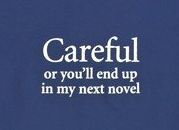
- I can’t put any weight on my foot.
